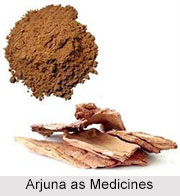 Arjuna scientifically named as Terminalia Arjuna, extracts have been widely used in Ayurvedic medicine. The bark of the tree has been used for several centuries for treating cardiovascular ailments. It has a host of other therapeutic benefits including treating asthma, hypertension and kidney stones.
Arjuna scientifically named as Terminalia Arjuna, extracts have been widely used in Ayurvedic medicine. The bark of the tree has been used for several centuries for treating cardiovascular ailments. It has a host of other therapeutic benefits including treating asthma, hypertension and kidney stones.
The bark from the Arjuna tree has been used for thousands of years in Ayurveda to support numerous health concerns including, prominently, cardiovascular health. It is considered tonic, astringent and cooling, and is used in contusions, fractures, ulcers, etc.
Dose of Arjuna in Medicine
In diseases of the heart it is used in a variety of ways. Thus a decoction of the bark with milk is given as a nourishment. The powdered bark is given with milk, treacle or water. A ghrita is prepared with the decoction and paste of the bark for internal use.
In fractures and contusions with extensive ecchymosis, powdered Arjuna bark is recommended to be taken internally with milk. A decoction of the bark is used as a wash in ulcers and chancres.
This article is a stub. You can enrich by adding more information to it. Send your Write Up to content@indianetzone.com
Related Articles
Ayurveda
Origin of Ayurveda
Ayurveda Medication
Elements of Ayurveda
Concepts of Ayurveda
Ancient Literature of Ayurveda
Sushruta Samhita




















